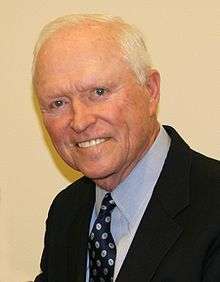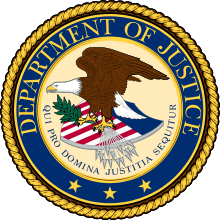Benjamin Civiletti
Benjamin Richard Civiletti (born July 17, 1935) served as the United States Attorney General during the Carter administration, from 1979 to 1981. He was the first Italian American to serve as Attorney General. He is a former senior partner in the Baltimore-based law firm of Venable LLP (known until 2003 as Venable, Baetjer & Howard),[1] where he specialized in commercial litigation and internal investigations.
Ben Civiletti | |
|---|---|
 | |
| 73rd United States Attorney General | |
| In office August 16, 1979 – January 19, 1981 | |
| President | Jimmy Carter |
| Preceded by | Griffin Bell |
| Succeeded by | William French Smith |
| 17th United States Deputy Attorney General | |
| In office May 16, 1978 – August 16, 1979 | |
| President | Jimmy Carter |
| Preceded by | Peter F. Flaherty |
| Succeeded by | Charles B. Renfrew |
| United States Assistant Attorney General for the Criminal Division | |
| In office March 10, 1977 – May 16, 1978 | |
| President | Jimmy Carter |
| Preceded by | Dick Thornburgh |
| Succeeded by | Philip Heymann |
| Personal details | |
| Born | Benjamin Richard Civiletti July 17, 1935 Peekskill, New York, U.S. |
| Political party | Democratic |
| Spouse(s) | Gaile Lundgren |
| Children | 3 |
| Education | Johns Hopkins University (BA) University of Maryland, Baltimore (LLB) |
Since 2001, Civiletti has been one of the three members of the Independent Review Board,[2] a board that the International Brotherhood of Teamsters union must answer to when allegations of corruption or organized crime infiltration surface under the terms of a consent decree issued in 1989 [3] by a federal district court judgment.[4]
Early life and career
Born in Peekskill, New York in 1935, Civiletti graduated from Johns Hopkins University, where he received an A.B. in psychology in 1957,[5] and from the University of Maryland School of Law in Baltimore, Maryland, where he received a LLB in 1961.[6][7]
Civiletti was a law clerk for W. Calvin Chesnut, a judge on the U.S. District Court for the District of Maryland, and became an Assistant United States Attorney in Baltimore a year after graduating from law school.
.jpg)
Civiletti was serving as the Deputy Attorney General when his boss Griffin B. Bell resigned. He was elevated to the top job in the Justice Department on July 19, 1979. Although Bell resigned voluntarily, his resignation occurred during a major Cabinet shakeup in the Carter administration. Secretary of Health, Education, and Welfare Joseph A. Califano, Jr. and Secretary of the Treasury W. Michael Blumenthal also resigned the same day. Transportation Secretary Brock Adams soon followed.
Civiletti had come to Bell's attention when he was forming the Justice Department for the newly elected president by Carter's close confidant, Charles Kirbo, a law partner of Bell's who had once been involved in a case with Civiletti. Civiletti served as assistant attorney general in charge of the Criminal Division and was elevated to deputy attorney general after the resignation of Carter's first deputy attorney general, Peter F. Flaherty, the former mayor of Pittsburgh.
As the Attorney General, Civiletti argued several important cases on behalf of the U.S. government. Notably, he argued before the International Court of Justice on behalf of Americans being held captive in Iran during the Iran hostage crisis, in the Case Concerning United States Diplomatic and Consular Staff in Tehran.[8] He also argued before the Supreme Court in support of the government's right to denaturalize Nazi war criminals in Fedorenko v. United States.
Opinions written by Civiletti as attorney general, which interpreted the Constitution and federal law to say that government cannot operate until Congress agrees on a spending bill, set the stage for partial government shutdowns in later years.[9]
While serving as Attorney General, and in spite of public opposition from Puerto Rico's Governor who believed it would encourage more terrorism, Civiletti recommended, and President Carter agreed, to a commutation of sentences to time served for four unrepentant Puerto Rican nationalists convicted of shooting five U.S. Congressmen at the U.S. Capitol.[10][11]
On July 10, 2008, Maryland Governor Martin O'Malley announced that Civiletti would serve as the chairman of the Maryland Commission on Capital Punishment, set up to study the application of capital punishment in Maryland and make a recommendation on the abolition of the death penalty in Maryland.[7] On November 12, 2008, the Commission voted 13-7, with Civiletti voting with the majority, to recommend that the Maryland General Assembly abolish capital punishment in the state.[12]
Personal life
Civiletti and his wife, the former Gaile L. Lundgren, had three children, Benjamin H., Andrew S. and Lynne T. Civiletti.
References
- "Attorney General: Benjamin Richard Civiletti". Retrieved 2019-10-16.
- "The Independent Review Board". Retrieved 2018-01-19.
- "Teamster Corruption and the Consent Decree". Retrieved 2019-10-16.
- The Independent Review Board.
- "Benjamin R. Civiletti". Venable LLP. Retrieved July 15, 2010.
- "Governor O'Malley Announces Benjamin Civiletti as Chairman of Maryland Commission on Capital Punishment, Announces Commission Members". Annapolis, Maryland: Office of the Governor. July 10, 2008. Archived from the original on June 21, 2010. Retrieved July 15, 2010.
- "Transcript" (PDF). Archived from the original (PDF) on 2014-02-23. Retrieved 2013-05-23.
- Scott Horsley (8 April 2011). "The Lawyer Who Raised The Shutdown Stakes". NPR. NPR. Retrieved 12 January 2019.
- "Puerto Rican Nationalists Announcement of the President's Commutation of Sentences". The American Presidency Project. 6 September 1979. Retrieved 12 January 2019.
- "Nation: We Have Nothing to Repent". TIME. Time Inc. 24 September 1979. Retrieved 12 January 2019.
- Dechter, Gadi; Smitherman, Laura (November 13, 2008). "Repeal of death penalty urged". The Baltimore Sun. Retrieved July 15, 2010.
External links
| Legal offices | ||
|---|---|---|
| Preceded by Peter F. Flaherty |
U.S. Deputy Attorney General Served under: Jimmy Carter 1978–1979 |
Succeeded by Charles B. Renfrew |
| Preceded by Griffin B. Bell |
U.S. Attorney General Served under: Jimmy Carter 1979–1981 |
Succeeded by William French Smith |

